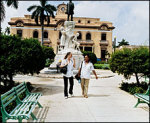La solución cubano para los estudiantes de medicina de la minoría pobre
por
Michael Johns, Project Manager | July 28, 2006

As reported on the Washington Post website, Monday, July 24, 2006.
The Cuban Solution for poor minority medical students
Melissa Mitchell wants to be a doctor to tend to the poor. But the Howard University undergrad was too poor herself to attend medical school. That's when Cuba's maximum leader offered a helping hand.
Back when Melissa was a premed student at Howard University, studying in the dark was never an issue. But this isn't Washington. This is Cuba, where Melissa, Revery and 95 other Americans are studying medicine in a country that's been an anathema to the United States for almost five decades. Thanks to Fidel Castro, their education is free. But that doesn't mean they aren't paying a price for turning to Cuba in their quest to become doctors. They've given up creature comforts most Americans take for granted, struggled to master hematology and other complicated subjects in a foreign language, and have no guarantees they will get a chance to practice medicine in the United States.
Right now, though, Melissa, 25, and Revery, 26, aren't thinking about any of that. Melissa, a third-year student, says she has to do well on this test because the professor is on her case. Cuban doctors place a premium on basic skills -- interpreting breath sounds from a stethoscope, for instance -- that have been deemphasized in the high-tech world of U.S. medicine. Not long ago during rounds, Melissa's professor exploded at her when he asked for a diagnosis of a patient, and she replied that the lab results weren't back yet.
"Are you planning to become a doctor or a lab analyst?" he growled. "Tell me what you heard and felt and saw."
To study for the exam, Melissa and Revery have already walked a couple of miles from the blackout-darkened dorms at Salvador Allende Hospital in central Havana to a Cuban friend's house. They were hoping that this neighborhood near the famous Malecon would still have electricity. No such luck.
"I reviewed anemia already," Melissa tells Revery. "I'll teach you anemia if you do diabetes" with me. Revery tilts her head low to illuminate a page, and they get to work.
Within a few hours, their last candle sputters out. The laptop is already dead. Soon the flashlight batteries lose strength, dimming the light from bright white to dingy yellow. Before being plunged into pitch blackness, the two begin packing up, filling backpacks with notes and books. The plan: walk back to the dorm because maybe lights have returned to that part of town. If not, Melissa's Cuban boyfriend has a flashlight. They'll walk to his house to borrow it.
